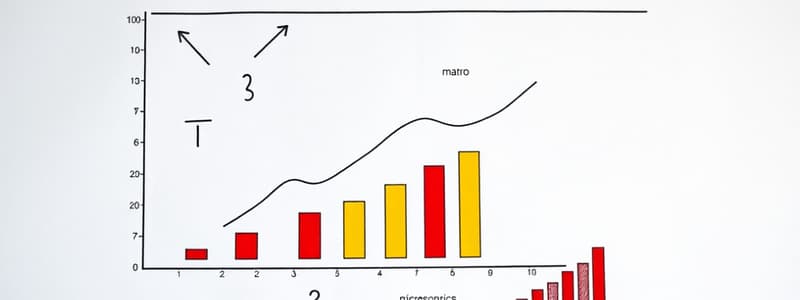Podcast
Questions and Answers
What is the study of how to manage money and the financial status of an individual, an enterprise, an organization, or a country called?
What is the study of how to manage money and the financial status of an individual, an enterprise, an organization, or a country called?
Economics
Which branch of economics deals with individuals, households, and specific companies?
Which branch of economics deals with individuals, households, and specific companies?
- Macroeconomics
- Microeconomics (correct)
- Both Microeconomics and Macroeconomics
- None of the Above
What refers to the existence of limited resources that are not enough to address unlimited human needs or demands?
What refers to the existence of limited resources that are not enough to address unlimited human needs or demands?
Scarcity
A shortage occurs when supply exceeds demand at a given time.
A shortage occurs when supply exceeds demand at a given time.
What is the term for the loss from setting aside the value of pursuing other alternatives with the same amount?
What is the term for the loss from setting aside the value of pursuing other alternatives with the same amount?
Free resources can be obtained and used without any costs.
Free resources can be obtained and used without any costs.
Match the following costs to their descriptions:
Match the following costs to their descriptions:
What needs are essential for one’s survival?
What needs are essential for one’s survival?
Diminishing marginal utility refers to the increased usefulness gained from consuming more of a product over time.
Diminishing marginal utility refers to the increased usefulness gained from consuming more of a product over time.
Which of the following refers to goods that directly satisfy human needs/wants?
Which of the following refers to goods that directly satisfy human needs/wants?
What do we call goods that have a physical identity?
What do we call goods that have a physical identity?
What are resources that exist in nature, like land and water, called?
What are resources that exist in nature, like land and water, called?
Renewable resources can be regenerated and sustained over a long period of time.
Renewable resources can be regenerated and sustained over a long period of time.
Flashcards are hidden until you start studying
Study Notes
Economic Principles
- Economics studies financial management of individuals, businesses, organizations, and nations while addressing production questions: what, how, and for whom.
Branches of Economics
- Microeconomics focuses on individuals, households, and specific companies.
- Macroeconomics examines society as a whole and its global interactions.
Scarcity and Shortage
- Scarcity indicates limited resources insufficient to meet unlimited human demands.
- Shortage occurs when market demand exceeds available supply at a specific time.
Costs and Resource Evaluation
- Rationalization assesses the value of goods based on exchange costs.
- Opportunity Cost represents the loss from choosing one alternative over another.
- Free Resources are those available without cost, exceeding current needs.
Types of Costs
- Intrinsic Cost has no actual cash outlay.
- Extrinsic Cost involves identifiable monetary expenses.
Human Needs and Wants
- Unmet needs and wants can lead to feelings of inadequacy and distress, influenced by factors beyond economics.
- Primary Needs are essential for survival, whereas Secondary Needs enhance happiness and status.
Inputs in Production
- Fixed Inputs are limited in the short run, available until maximum output.
- Variable Inputs are used in longer production periods.
Utility and Its Principles
- Utility measures satisfaction gained from consuming goods or services.
- Diminishing Marginal Utility explains reduced satisfaction from continuous consumption of the same product.
- The Saturation Point is reached when utility is maximized.
- Diminishing Marginal Returns occurs when effort expended exceeds the benefit received from consumption.
Economic Activities
- Economic Activities encompass the production, distribution, and consumption of goods and services, facilitating the movement of these commodities.
Goods and Resources
- Tangible Goods are physical products, while Intangible Goods represent services.
- Economic Resources satisfy needs and wants, directly or indirectly.
- Consumption Goods directly meet human needs/wants, while Capital Goods support those needs indirectly.
Resource Sustainability
- Renewable Resources regenerate sustainably over time (e.g., watersheds, forests).
- Nonrenewable Resources are finite and exhaustible (e.g., coal, minerals).
- Natural Resources exist naturally in the environment (e.g., land and water).
Studying That Suits You
Use AI to generate personalized quizzes and flashcards to suit your learning preferences.




